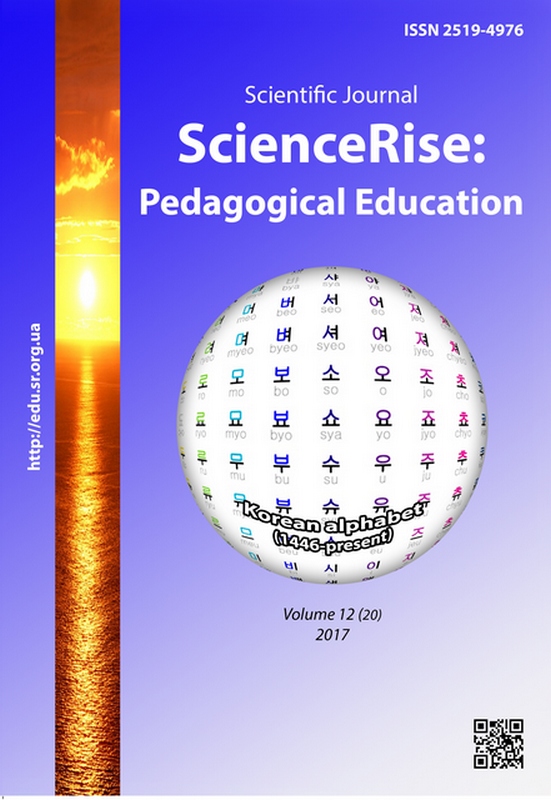The role of the teacher in the process of forming the communicative competence of the junior pupils based on the structural approach to personality
DOI:
https://doi.org/10.15587/2519-4984.2017.120051Keywords:
communicative competence, communicative skills of school teacher, junior schoolchildren, personality structureAbstract
The communicative competence of the junior pupils involves the formation of a number of components, including social and perceptual components, a communicative component, and an interactive component. The interaction of these factors contributes to the implementation of personality abilities in the process of communication. In the process of forming the communicative competence of junior pupils the decisive role belongs to the teacher of elementary school. To succeed in this important task, the teacher must possess a number of skills: gnostic skills, design skills, constructive skills, communicative skills, and organizational skills. The effectiveness of the process of forming the communicative competence of junior pupils depends to a large extent on understanding the essence of the personality. In this regard the effective concept of the development of personality is the concept, developed by K.K. Platonov. This concept consists of four substructures: the orientations and relationships of personality, experience of personality, individual characteristics of mental processes of personality and biopsychic properties of personality.
In each of the substructures there are important features for the development of the communicative competence. The substructure of orientation and personal relationships comprises desire, interests, inclinations, aspirations, ideals, beliefs, and a worldview. The substructure of experience includes knowledge, skills and habits. The substructure of individual peculiarities of mental processes includes emotions, sensations, thinking, perception, feelings, and will. In the substructure of biopsychic properties there are sexual and age properties of the personality, and typological properties of the person (temperament). For each of the substructures, certain means of developing communicative competence are defined: for the substructure of orientation and personality relationships the role play is used; for the substructure of experience the exercises are used; for the substructure of the individual peculiarities of mental processes the tasks are used; and for the substructure of biopsychic properties, the corresponding modes of work for pupils with different typological features are usedReferences
- Korniiaka, O. M. (2009). Suchasni pidkhody do vyvchennia komunikatyvnoi kompetentnosti osobystosti. Problemy suchasnoi psykholohii, 3, 180–194.
- Yurchenko, V. I. (2013). Formuvannia v uchniv komunikatyvnoi kompetentnosti – vazhlyve zavdannia pochatkovoi shkoly. Imidzh suchasnoho pedahoha, 4 (133), 59–62.
- Dubaseniuk, O. A., Semeniuk, T. V., Antonova, O. Ye. (2003). Profesiyna pidhotovka maibutnoho vchytelia do pedahohichnoi diialnosti. Zhytomyr: Zhytomyrskyi derzhavnyi universytet, 192.
- Marushchak, O. M. (2017). Formuvannia komunikatyvnoi kompetentnosti molodshykh shkoliariv zasobamy dytiachoi periodyky. Zhytomyr: Vyd-vo ZhDU im. I. Franka, 134.
- Meleshko, L. V. (2017). Formuvannia movlennievoi kompetentnosti uchniv u protsesi navchannia ukrainskoi movy z vykorystanniam kompiuternykh ihor. Informatsiyni tekhnolohiy i zasoby navchannia, 60 (4), 87–94.
- Kopeliuk, S. (2015). Formuvannia komunikatyvnoi kompetentnosti uchniv pochatkovoi shkoly na urokakh literaturnoho chytannia. Hirska shkola Ukrainskykh Karpat, 12-13, 163–165.
- Lioznova, Ye. V. Osoblyvosti nervovoi systemy i spilkuvannia molodshykh shkoliariv. Available at: http://tanuares.ru/rizne/31235-osoblivosti-nervovoi-sistemi-i-spilkuvannja.html
- Platonov, K. K. (1986). Struktura i razvitie lichnosti. Moscow: Nauka, 255.
- Khromchenko, O. O. Formuvannia komunikatyvnoi kompetentnosti molodshykh shkoliariv. Available at: https://urok-ua.com/formuvannya-komunikatyvnoji-kompetentnosti-molodshyh-shkolyariv/
- Savchenko, L. S. (2016). Formuvannia komunikatyvnoi kompetentnosti molodshykh shkoliariv. Available at: http://klasnaocinka.com.ua/uk/article/formuvannya-komunikativnoyi-kompetentnosti-molodsh-2.html
- Savchenko, L. S. (2016). Formuvannia komunikatyvnoi kompetentnosti molodshykh shkoliariv. Available at: http://klasnaocinka.com.ua/uk/article/formuvannya-komunikativnoyi-kompetentnosti-molodsh-2.html
- Kornieva, L. (2013). Hendernyi aspekt komunikatsii. Filolohichni nauky, 13, 106–113.
Downloads
Published
How to Cite
Issue
Section
License
Copyright (c) 2017 Vasyl Zhukovskyy

This work is licensed under a Creative Commons Attribution 4.0 International License.
Our journal abides by the Creative Commons CC BY copyright rights and permissions for open access journals.
Authors, who are published in this journal, agree to the following conditions:
1. The authors reserve the right to authorship of the work and pass the first publication right of this work to the journal under the terms of a Creative Commons CC BY, which allows others to freely distribute the published research with the obligatory reference to the authors of the original work and the first publication of the work in this journal.
2. The authors have the right to conclude separate supplement agreements that relate to non-exclusive work distribution in the form in which it has been published by the journal (for example, to upload the work to the online storage of the journal or publish it as part of a monograph), provided that the reference to the first publication of the work in this journal is included.







